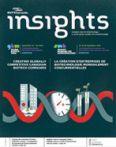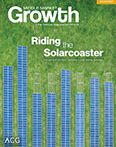The Omicron Variant: Mother Nature’s COVID-19 Vaccine?
For several weeks, much of the world has been obsessed with the Omicron variant of the virus that causes COVID-19. What initially started as a trickle of media reports about a highly-mutated and rapidly-spreading “variant of concern” that originated in Africa quickly transformed into a global hysteria that once again closed borders, disrupted global stock markets, switched countless schools and universities to virtual learning, triggered broadening of vaccination and booster mandates, and persuaded some officials in the United States government to predict a “winter of death” and caution families not to gather over the sacred holiday period. Is this fear and isolation truly warranted?
This panic has been fueled solely by rising COVID case counts (some of which could be attributed to increased testing) coupled with the government’s and mainstream media’s addiction to fostering fear and hysteria. As both a physician and scientist, I believe it is essential that we take a measured, evidence-based approach to dealing with Omicron. And when we look at the totality of the emerging facts, there is a very real possibility that Omicron could lead us into light instead of darkness. Here’s why:
To understand why the Omicron variant could be a blessing in disguise — and possibly usher in the end of the COVID-19 pandemic by acting as Mother Nature’s vaccine — we must examine what makes this virus unique. The Omicron variant has over 26 mutations in its RNA sequence, which is a tremendous number of changes in the genetic sequence of the virus. Among these many mutations is an “insertion” where a new letter is inserted into the gene sequence. Interestingly, this sequence resembles that of another coronavirus, which causes the common cold. The Omicron variant may have picked up genetic sequences from a common cold coronavirus in someone who was infected with both viruses and, in doing so, become weakened.
Because of the enormous number of mutations, the Omicron variant is in many ways a totally new virus. It appears that it has become more transmissible (doubling in just 1-2 days), in part due to its ability to evade immunity, while becoming a lot less deadly. While the case numbers have spiked, data from South Africa and the UK have suggested that the chance of becoming very sick or dying has plummeted by 80% or higher.
Why is this so important? Because viruses compete with one another, and the Omicron variant is rapidly replacing the more dangerous Delta variant. Soon, it could become the only COVID virus around, causing no more than a bad cold in most people, particularly the vaccinated. And as it rapidly spreads throughout this holiday season as we all travel and congregate — even with vaccinations and masks — the Omicron variant is effectively giving every person it touches a type of immunity that no COVID vaccine has yet given us: a robust, possibly long-acting immunity against the entire virus, rather than just the spike protein. We know from many other vaccines that exposing the body to a weakened or attenuated version of a live virus can produce the most effective protection. Anyone who has been vaccinated against measles, mumps, rubella, rotavirus, chickenpox, smallpox, or yellow fever has actually been injected with a live, attenuated version of the very same virus that causes disease.
So, if the Omicron variant acts like a live, attenuated COVID vaccine that rapidly spreads in the air, rather than through a needle, we might very well emerge from this holiday season finally facing an end to the deadly phase of pandemic. And if you add to this the widespread availability of vaccinations for those at risk and two newly FDA-approved oral treatments for COVID-19 that can reduce hospitalization by yet another 80%, there is indeed a very bright light at the end of this long and dark tunnel. Let’s look forward to 2022 with hope and view it as an opportunity to heal, rebuild, and move on.
Happy New Year.
Houman David Hemmati, M.D., Ph.D. is a board-certified ophthalmologist and biomedical research scientist in Santa Monica, California. Dr. Hemmati earned a BS in Biological Sciences from Stanford University, an MD from UCLA School of Medicine, and a PhD from Caltech, and completed an internship in Internal Medicine at Stanford Hospital, an ophthalmology residency at the Wilmer Eye Institute at Johns Hopkins Hospital, a postdoctoral research fellowship in chemical engineering at MIT, and a clinical fellowship at Harvard Medical School. He has co-founded and helps run two pharmaceutical companies developing treatments for eye diseases like macular degeneration, and has published extensively in the areas of stem cell research and blinding eye diseases.



